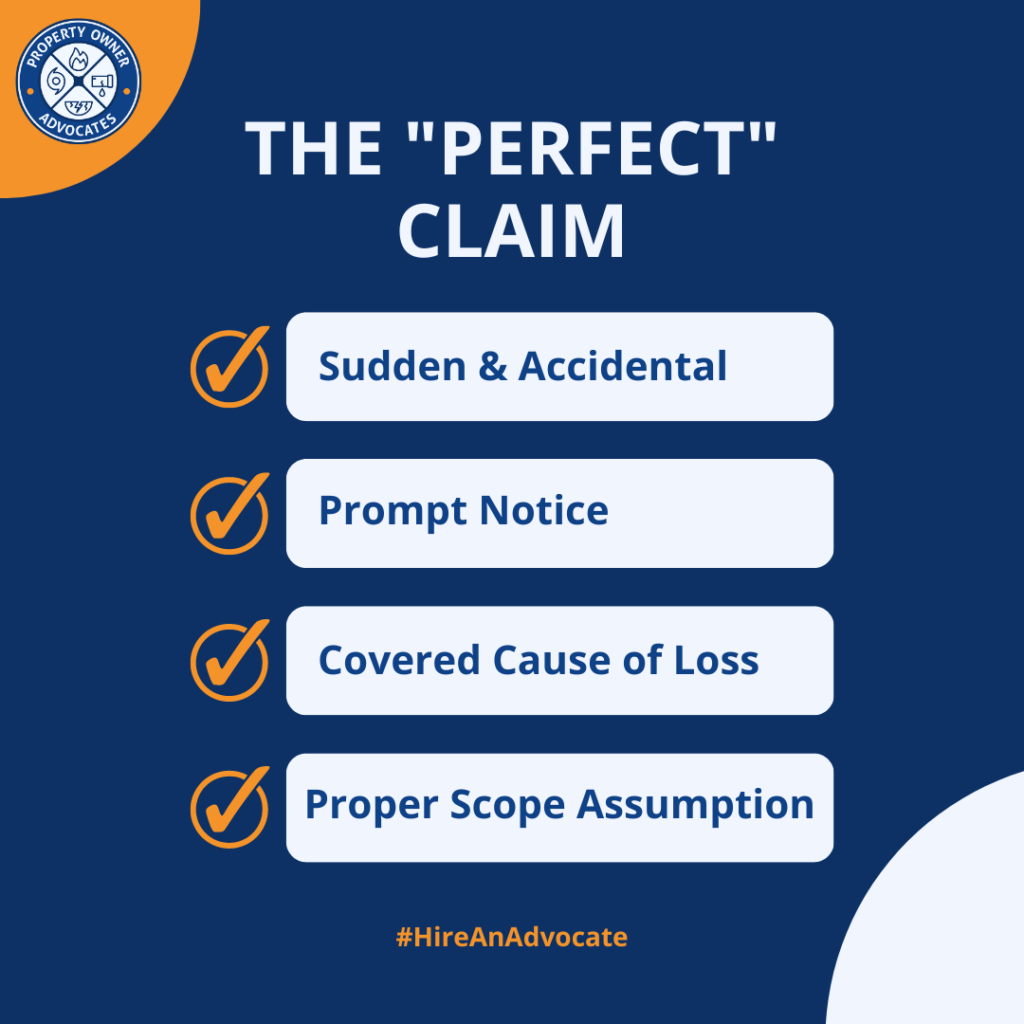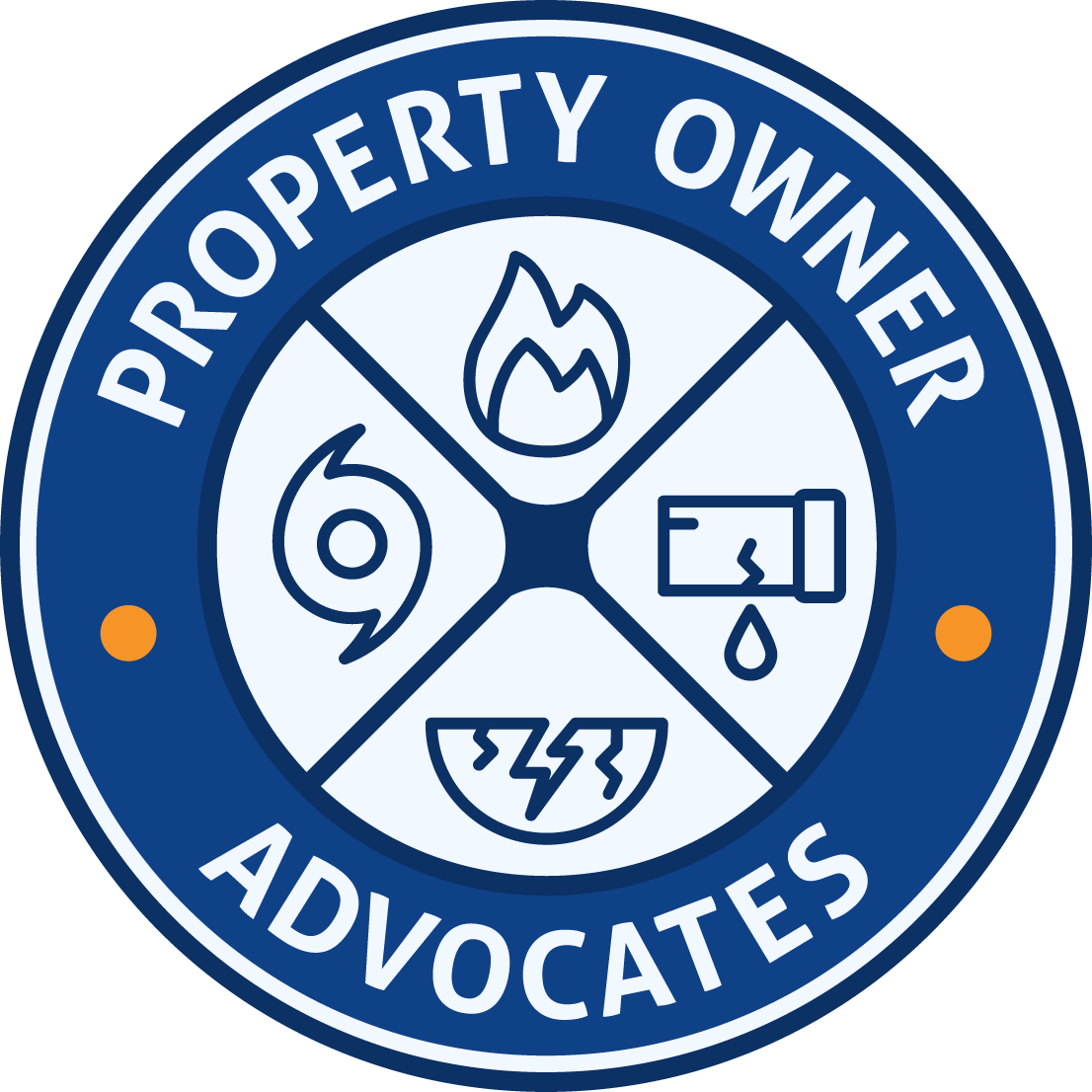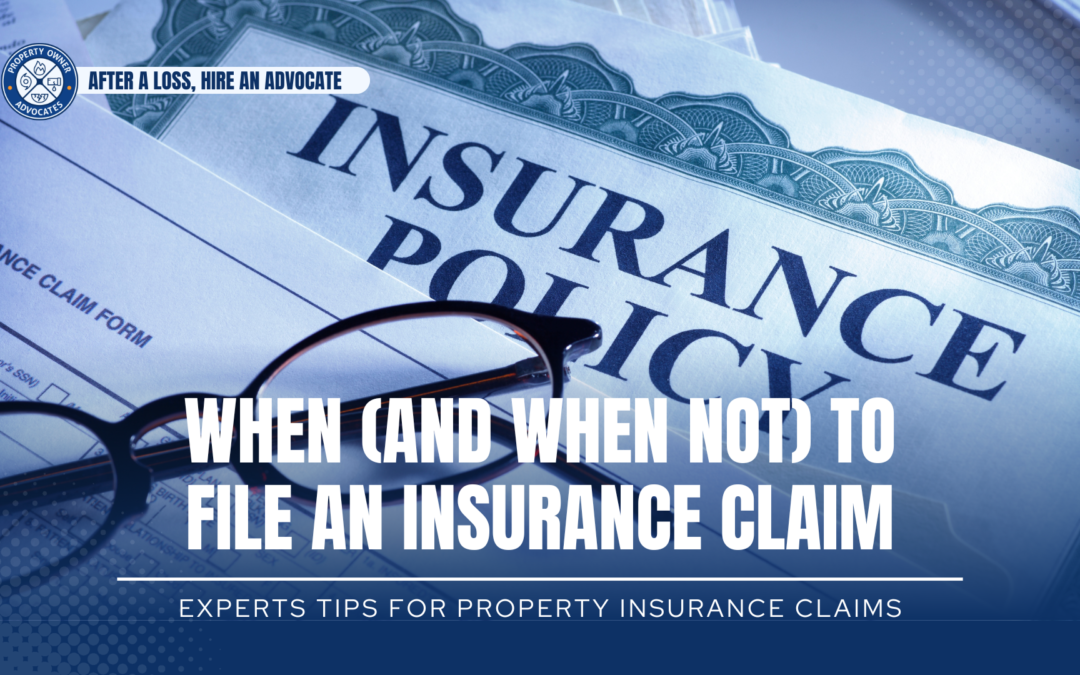As a property owner, facing unexpected damages to your home or business can be a daunting experience. The decision to file an insurance claim is not to be taken lightly, as it can many different implications. Understanding the key factors that determine when to file a property insurance claim is essential to making an informed decision. Additionally, it is vital to be aware of insurance fraud and how to avoid falling into its trap. After reading through this blog, you should have a better understand of when to file a claim and when not to.
What Is The Ideal Claim?

This may sound weird, but it’s true – there is such a thing as a “perfect claim”. Of course, we’re not saying that having to go through the stress and obstacles of dealing with property damage and a property insurance claim is remotely “perfect”. What we are saying is that if you ever find yourself in this situation, there are factors and details that will make for a relatively easy claim to process and get paid for. Here are a few factors that will make your claim “perfect” in the eyes of the insurance carrier and ultimately get you a fair and reasonable settlement
- Sudden and Accidental Loss: This is one of the most common conditions in your insurance policy. In order for your damages to be covered under your insurance policy, it is likely that the event was sudden and/or accidental (not on purpose)
- Prompt Notice of Loss: Notifying your insurance company about your damages in a timely manner is crucial, the sooner the better.
- Covered Cause of Loss: The ultimate cause of the damages needs to be covered under your property insurance policy
- Proper Assumption of Scope: Not overinflating or exaggerating the damages will make sure that you and your insurance company are on the same page and that your claim gets paid quickly and fairly
Assessing Your Property Damage
One of the first questions you should ask yourself after sustaining damages to your property and before you actually file a claim is, “Will these damages meet my deductible”? (more on understanding your deductible below). The fact is, not all property damage warrants filing a claim. To inspect your property for damages, begin with a visual inspection of the property by doing a walkthrough of the affected area. You should do your best to document any visible damage, taking clear photos and videos from multiple angles to create a complete record. One of the most common property damages are water damages. Water damage can often go unnoticed, leading to mold growth and structural issues. Addressing water damage quickly can help prevent more extensive problems down the line. The best thing to do in cases where you aren’t sure is to call an expert. Here are a few things to consider:
- Severe Damage: If the damage is extensive, involving structural elements, major systems, or affecting a significant portion of the property, it’s wise to consult an expert.
- Hidden Damage: If the damage is not immediately visible but you think it is present, an expert can use specialized equipment to identify hidden issues. This is especially important for damage like water intrusion, which can lead to mold growth and long-term structural problems.
Understanding Coverage Limits and Deductible
Some policies may have specific limits for certain types of damages or losses. For example, Citizens Property Insurance (very common insurer in South Florida) has a $10,000 water damage limit. This means that the most they will pay for a covered water damage claim is $10,000. If your deductible is $2,500 and assuming you hit the policy limit the most you will actually receive is $7,500. In addition, if the cost of repairs or replacement exceeds your policy’s coverage limits, filing a claim may not result in full compensation.
Will My Premiums Go Up If I File A Claim?
This isn’t a black-and-white answer, but the easiest way to answer it is, possibly. Insurance companies may view policyholders who file frequent claims as higher-risk, which can lead to increased premiums and even policy non-renewal. But this isn’t the whole picture of your rising premiums. You may have never filed a claim, and yet you are still seeing your premiums rise. Here are a few other contributing factors that go into your premium:
- Reinsurance Premiums: Reinsurance companies are best described as “insurance for the insurance company”. The more “claims” that insurance companies make (after paying their claims to their customers), the more their reinsurance premiums rise. Other factors contribute the reinsurance rates, but that basic correlation is enough for this blog – those rising reinsurance premium costs are passed down to us as increased insurance premiums.
- Deductible Amount: Higher deductibles can lower your premium, but this will result in more financial liability in the event of a claim.
- Property Type and Use: Residential properties, commercial properties, rental properties, and vacation homes may have different risk profiles. Commercial properties tend to have higher premiums due to increased liability risks.
- Geographic Area: Properties located in areas prone to natural disasters like hurricanes, earthquakes, floods, or wildfires are considered higher risk and will generally have higher premiums.
The Definition of Insurance Fraud and How to Avoid It
Insurance fraud is define as the act of intentionally deceiving an insurance company for financial gain. It is illegal and carries severe consequences, such as policy cancellation (that is best case scenario, all things considered) and even criminal charges. As a property owner, it’s essential to recognize and avoid any behavior that may be perceived as insurance fraud. The following list are types of insurance fraud:
- Exaggerating Claims: Inflating the value of damages or losses to receive a higher claim payout.
- Deliberate Damage: Intentionally causing damage to property to claim insurance benefits.
- Misrepresentation of Facts: Providing false information or withholding relevant details during the claims process in order to influence the outcome in your favor.
- Filing False Claims: Submitting claims for damages that did not occur or claiming damages that are pre-existing.
To avoid inadvertently engaging in insurance fraud, follow these guidelines:
- Be Truthful and Accurate: Report damages or losses as they occur, without exaggeration or omission.
- Document the Damage: Thoroughly document the damages with photos, videos, and detailed descriptions.
- Report Pre-existing Damage: Disclose any pre-existing damage to your property during the claims process. It’s better to have a claim denied for a valid reason than to face the severe consequences of withholding information from your insurance company.
- Seek Professional Guidance: If you have any uncertainties about the claims process or your coverage, consult with a reputable public adjuster or insurance professional for guidance.

Filing a property insurance claim should be a well-considered decision, taking into account the severity of the damage, your coverage limits, and the potential impact on future premiums. Prioritize significant damages that require immediate attention and restoration to safeguard your property’s value and safety.
Need help with your property insurance claim?

